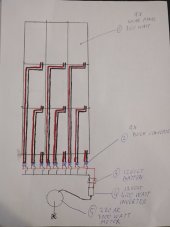Solarcraft
New Member
- Joined
- May 16, 2021
- Messages
- 8
Hello everyone.
I have a project on the go and I would like to get some advice on what would be the best options to rig up solar panels on an aluminum pontoon boat.
One of the pontoon boats I am planning to convert is 19 feet by 8 feet / 5.8 by 2.4 meters.
I plan to cover the entire boat with panels, so I can do 9 X 360 watt panels... the panels I can get are 3.3 X 6.6 feet or 1 X 2 meters.
( Being in Thailand, sunlight is almost always there and shade is a good thing!)
Anyway I figure the total watts will be around 3200 watts.
I was thinking about get several small charge controllers and using only 1 or 2 batteries as a buffer but running mainly on the power from the panels
... Lately I have been thinking about using dc to dc buck converters.
I am thinking ,, If I was to get a buck converter for each panel and connect them in parallel, I would need an automatic cut in and off switch to protect the battery right!??
My inverter is 6000 watts 12 volts pure sine wave so I want to stay with 12 volts.
I know I can run an AC motor from there which will be cheap for me to get.
If anyone out there can tell me if I am mistaking about using buck converters? And about the battery protect switch does anyone know what I could use??
Alex.
I have a project on the go and I would like to get some advice on what would be the best options to rig up solar panels on an aluminum pontoon boat.
One of the pontoon boats I am planning to convert is 19 feet by 8 feet / 5.8 by 2.4 meters.
I plan to cover the entire boat with panels, so I can do 9 X 360 watt panels... the panels I can get are 3.3 X 6.6 feet or 1 X 2 meters.
( Being in Thailand, sunlight is almost always there and shade is a good thing!)
Anyway I figure the total watts will be around 3200 watts.
I was thinking about get several small charge controllers and using only 1 or 2 batteries as a buffer but running mainly on the power from the panels
... Lately I have been thinking about using dc to dc buck converters.
I am thinking ,, If I was to get a buck converter for each panel and connect them in parallel, I would need an automatic cut in and off switch to protect the battery right!??
My inverter is 6000 watts 12 volts pure sine wave so I want to stay with 12 volts.
I know I can run an AC motor from there which will be cheap for me to get.
If anyone out there can tell me if I am mistaking about using buck converters? And about the battery protect switch does anyone know what I could use??
Alex.



